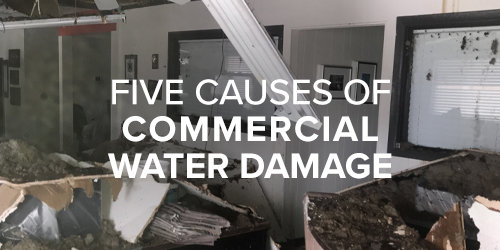When business owners visualize water damage, they often picture a massive storm wiping out power lines, flooding offices, and shutting down businesses for days at a time. It is true that commercial water damage is often the result of water that stems from weather events and storms such as floods.
However, many commercial renters and entrepreneurs forget that severe weather and storms aren’t the only causes of water damage. Here are some of the typical causes of water damage to commercial buildings:
1. Broken pipes and plumbing
Just like in a residence, if the plumbing system in your workplace fails, water damage could be the result.
2. Malfunctioning sprinkler systems
Some older retail and office buildings still have outdated sprinkler systems that work in conjunction with fire protection systems. These sprinklers certainly come in handy during a fire emergency, however, they can also cause commercial flood damage if they are faulty or in need of replacement. Inventory and business assets could easily be damaged.
3. Damaged appliances and equipment
This type of flood damage is more common in restaurants and catering facilities, as well as any business that has appliances and equipment that make use of water. If the appliance fails and sends water across your building, especially after working hours when no one is around, you may face a water emergency when coming back to work.
4. Backed up sewer lines
This is another cause of commercial water damage that often catches business owners by surprise. Should the sewer line to your building back up or become damaged, you could potentially have Black Water. The potential dangers of contaminated Blackwater are serious health risks and can ruin products and office furnishings
5. Mother Nature
Natural disasters like hurricanes, flash flooding and severe thunderstorms can do lots of damage to your business. You certainly can’t control the weather, but you can control how ready you are for it. Some of the things you can do to keep the damage minimal are storing sensitive files and electronics at a higher level, installing barriers and keeping your gutters clear. You may also want to consider getting a risk assessment and adding flood insurance if you’re in an area where your risk is higher.
Ultimately, there’s no way to completely eliminate all the risk of water damage to your facility, but practicing good maintenance, taking preventative measures and knowing common culprits will help reduce your risks and respond better if something does occur. If you have any questions or need help, contact The Jones Companies.

